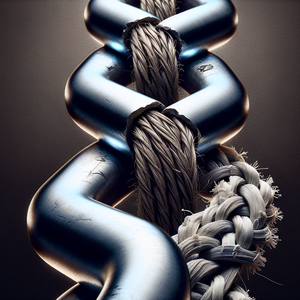The Soft Skills Revolution: Future-Proofing Careers in an Uncertain World

As automation and AI continue to handle repetitive cognitive and physical tasks, organizations are placing a premium on skills that machines cannot replicate: creativity, emotional intelligence, adaptability, and leadership. A 2020 report by the World Economic Forum (Future of Jobs Report) highlighted that demand for complex problem-solving, innovation, and interpersonal skills is increasing, but the need for soft skills like resilience, flexibility, and agility has skyrocketed as organizations scramble to navigate an uncertain future. The COVID-19 pandemic served as a wake-up call, illustrating the critical role soft skills play in times of crisis. Businesses had to rethink their strategies almost overnight, employees were forced to adapt to remote work environments, and entire industries were reshaped. Resilience, flexibility, and agility became the defining traits of success during this period, and they will remain pivotal as we move forward into an era characterized by hybrid work models, technological disruption, and shifting societal priorities.
Resilience: Turning Challenges Into Opportunities
Resilience, often described as the ability to recover quickly from setbacks, has become a cornerstone of professional success. In an era where uncertainty is the only constant, resilience is no longer just about surviving challenges but thriving through them. It empowers individuals to manage stress, adapt to change, and emerge stronger in the face of adversity. Consider the example of small businesses during the pandemic. Countless restaurants shifted to delivery-only models, fitness trainers transitioned to virtual classes, and retail stores moved their operations online. Resilient businesses not only weathered the storm but found innovative solutions that opened new revenue streams. On a personal level, employees who remained calm under pressure, maintained focus, and sought solutions rather than dwelling on problems often found themselves better positioned for leadership roles. Building resilience requires both mindset and practice. Individuals can adopt mindfulness techniques, invest in emotional well-being, and cultivate a growth mindset that views failure as a stepping stone to success. Organizations, on the other hand, can foster resilience by creating a culture of psychological safety, where employees feel supported and are encouraged to take risks without fear of repercussions.
Flexibility: Adapting to a Fluid Workplace
Flexibility has always been a valued trait, but its importance has soared in the age of hybrid work and constant change. Flexibility now means more than just being open to new ideas; it encompasses the ability to adapt to new technologies, workflows, and even entirely new industries. This skill is particularly crucial in a world where professional roles are becoming increasingly fluid and employees are expected to wear multiple hats. The tech industry offers a prime example of flexibility in action. Companies like Google and Microsoft have embraced hybrid work models, allowing employees to choose when and where they work. This approach not only improves employee morale but also enhances productivity and innovation. Conversely, organizations that resist flexibility risk losing top talent to competitors who offer better work-life balance and adaptability. For individuals, cultivating flexibility involves staying curious, embracing lifelong learning, and being willing to step out of one’s comfort zone. For organizations, fostering flexibility means rethinking traditional hierarchies, embracing new technologies, and providing employees with opportunities to upskill or transition into new roles. Flexibility is no longer a luxury; it is a survival strategy in an unpredictable world.
Agility: The Power to Pivot Quickly
Agility, often described as the ability to think and act quickly in response to change, has become a non-negotiable skill in today’s fast-paced, digital-first world. As industries are disrupted by technological innovations and market shifts, the ability to pivot effectively — without losing sight of long-term goals — is critical for success. Netflix serves as a textbook example of agility. Initially a DVD rental service, the company foresaw the decline of physical media and quickly transitioned to streaming. Later, it diversified into original content production, becoming a global leader in entertainment. This agility allowed Netflix to stay ahead of competitors and redefine the industry. For individuals, developing agility requires a commitment to continuous learning and iterative progress. Instead of striving for perfection in one giant leap, focus on making small, incremental improvements that allow for quick adjustments. Organizations, on the other hand, can build agility by fostering cross-functional teams, encouraging experimentation, and leveraging data-driven decision-making processes.
How to Cultivate Resilience, Flexibility, and Agility
The good news is that these soft skills are not innate traits; they can be developed and honed over time. Here are some practical strategies for both individuals and organizations: 1. Invest in Lifelong Learning - Stay curious and proactive about personal development. Online platforms like Coursera, LinkedIn Learning, and Udemy offer courses tailored to building resilience, flexibility, and agility. Organizations should encourage skill-building programs and provide access to professional development resources. 2. Embrace a Growth Mindset - Viewing challenges as opportunities to learn rather than obstacles to fear fosters resilience and flexibility. Individuals can adopt this mindset by reflecting on failures and reframing them as valuable lessons. Organizations can embed this mindset into their culture by celebrating efforts and learning rather than just outcomes. 3. Foster Collaboration - Working with diverse teams exposes individuals to new perspectives and enhances problem-solving abilities. Organizations can encourage cross-functional collaboration to break down silos and promote innovation. 4. Leverage Technology Wisely - Technology should be viewed as an enabler, not a threat. Tools like AI, data analytics, and automation can enhance agility by providing valuable insights and streamlining decision-making. Staying updated on industry trends and emerging tools is essential. 5. Prioritize Well-Being - Resilience is closely tied to mental and physical well-being. Organizations that provide mental health resources, flexible schedules, and wellness programs empower employees to perform at their best. Individuals should prioritize self-care, mindfulness, and work-life balance to maintain long-term resilience.
The workplace of tomorrow will demand more than technical expertise. As the world becomes increasingly volatile, uncertain, complex, and ambiguous, resilience, flexibility, and agility will emerge as the cornerstone skills that define success. These soft skills are no longer optional; they are essential for navigating change, overcoming challenges, and seizing opportunities in a rapidly evolving world. By embracing these power skills, individuals can future-proof their careers, and organizations can position themselves as leaders in their industries. The soft skills revolution is here — and it’s time to embrace it. Those who do will not just survive the future of work; they will thrive in it, shaping a world where human adaptability and creativity remain the ultimate competitive advantage.
Change Management Specialist
Consulting firms (e.g., Deloitte, Accenture), large corporations undergoing transformations, or government agencies
Description
Facilitate organizational transitions by developing and executing change management strategies to ensure smooth adoption of new technologies, processes, or structures.
Collaborate with leadership to assess the impact of change on employees and design communication and training plans to improve engagement and buy-in.
Analyze resistance to change and develop tailored solutions to overcome challenges, leveraging interpersonal and conflict-resolution skills.
Unique Skills
Expertise in change frameworks (e.g., ADKAR, Prosci)
Emotional intelligence
Stakeholder management
Agile Project Manager
Tech companies (e.g., Atlassian, Spotify), startups, or organizations undergoing digital transformation
Description
Lead cross-functional teams using agile methodologies (e.g., Scrum, Kanban) to deliver iterative improvements in software, product development, or organizational processes.
Act as a servant leader, fostering collaboration and adaptability while removing roadblocks to ensure teams stay productive and focused.
Communicate progress and manage stakeholder expectations in fast-paced, high-change environments.
Unique Skills
Agile certifications (e.g., Certified ScrumMaster, SAFe Agilist)
Ability to prioritize tasks amid ambiguity
Strong facilitation skills
Workplace Learning and Development Specialist
Fortune 500 companies (e.g., Amazon, Johnson & Johnson), universities, or HR consulting agencies
Description
Design and deliver training programs focused on enhancing soft skills such as resilience, adaptability, and leadership for employees at all levels.
Assess organizational needs and develop custom learning paths to address skill gaps, particularly in response to industry disruptions.
Stay ahead of trends in workplace education, leveraging tools like e-learning platforms and virtual workshops to create engaging experiences.
Unique Skills
Instructional design
Knowledge of adult learning principles
Expertise in emerging learning technologies
Business Continuity Analyst
Banks (e.g., JPMorgan Chase, Wells Fargo), healthcare providers, or global manufacturing firms
Description
Develop and maintain plans to ensure organizational resilience in the face of crises such as natural disasters, cyberattacks, or economic downturns.
Conduct risk assessments to identify vulnerabilities and create mitigation strategies to safeguard critical operations.
Collaborate with cross-functional teams to test and update continuity plans, ensuring swift adaptation to unforeseen disruptions.
Unique Skills
Proficiency in business impact analysis
Crisis communication
Regulatory compliance (e.g., ISO 22301)
Human-Centered Design Consultant
Design agencies (e.g., IDEO, Frog Design), tech giants (e.g., Apple, Google), or nonprofits addressing social challenges
Description
Use design thinking principles to craft user-centric solutions for products, services, or systems, emphasizing empathy and creativity.
Facilitate workshops and brainstorming sessions, encouraging teams to embrace diverse perspectives and innovate around complex problems.
Prototype and test ideas iteratively, gathering feedback to ensure solutions remain agile and aligned with user needs.
Unique Skills
Expertise in design thinking frameworks (e.g., Stanford d.school)
Storytelling
Ability to synthesize qualitative and quantitative data


